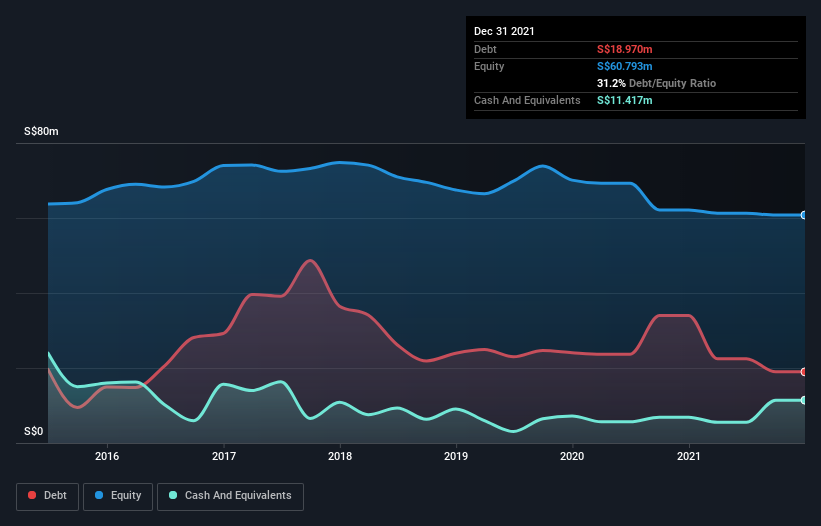- Singapore
- /
- Trade Distributors
- /
- SGX:BDU
Does Federal International (2000) (SGX:BDU) Have A Healthy Balance Sheet?

Howard Marks put it nicely when he said that, rather than worrying about share price volatility, 'The possibility of permanent loss is the risk I worry about... and every practical investor I know worries about.' So it might be obvious that you need to consider debt, when you think about how risky any given stock is, because too much debt can sink a company. We note that Federal International (2000) Ltd (SGX:BDU) does have debt on its balance sheet. But is this debt a concern to shareholders?
What Risk Does Debt Bring?
Generally speaking, debt only becomes a real problem when a company can't easily pay it off, either by raising capital or with its own cash flow. In the worst case scenario, a company can go bankrupt if it cannot pay its creditors. While that is not too common, we often do see indebted companies permanently diluting shareholders because lenders force them to raise capital at a distressed price. Of course, plenty of companies use debt to fund growth, without any negative consequences. When we examine debt levels, we first consider both cash and debt levels, together.
Check out our latest analysis for Federal International (2000)
How Much Debt Does Federal International (2000) Carry?
The image below, which you can click on for greater detail, shows that Federal International (2000) had debt of S$19.0m at the end of December 2021, a reduction from S$34.0m over a year. On the flip side, it has S$11.4m in cash leading to net debt of about S$7.55m.

How Healthy Is Federal International (2000)'s Balance Sheet?
According to the last reported balance sheet, Federal International (2000) had liabilities of S$56.5m due within 12 months, and liabilities of S$8.76m due beyond 12 months. Offsetting this, it had S$11.4m in cash and S$41.8m in receivables that were due within 12 months. So its liabilities outweigh the sum of its cash and (near-term) receivables by S$12.1m.
This deficit is considerable relative to its market capitalization of S$14.1m, so it does suggest shareholders should keep an eye on Federal International (2000)'s use of debt. This suggests shareholders would be heavily diluted if the company needed to shore up its balance sheet in a hurry. The balance sheet is clearly the area to focus on when you are analysing debt. But it is Federal International (2000)'s earnings that will influence how the balance sheet holds up in the future. So if you're keen to discover more about its earnings, it might be worth checking out this graph of its long term earnings trend.
In the last year Federal International (2000) had a loss before interest and tax, and actually shrunk its revenue by 12%, to S$60m. We would much prefer see growth.
Caveat Emptor
Not only did Federal International (2000)'s revenue slip over the last twelve months, but it also produced negative earnings before interest and tax (EBIT). Its EBIT loss was a whopping S$1.8m. Considering that alongside the liabilities mentioned above does not give us much confidence that company should be using so much debt. So we think its balance sheet is a little strained, though not beyond repair. On the bright side, we note that trailing twelve month EBIT is worse than the free cash flow of S$19m and the profit of S$334k. So one might argue that there's still a chance it can get things on the right track. The balance sheet is clearly the area to focus on when you are analysing debt. But ultimately, every company can contain risks that exist outside of the balance sheet. For example, we've discovered 4 warning signs for Federal International (2000) (2 are a bit concerning!) that you should be aware of before investing here.
If you're interested in investing in businesses that can grow profits without the burden of debt, then check out this free list of growing businesses that have net cash on the balance sheet.
New: AI Stock Screener & Alerts
Our new AI Stock Screener scans the market every day to uncover opportunities.
• Dividend Powerhouses (3%+ Yield)
• Undervalued Small Caps with Insider Buying
• High growth Tech and AI Companies
Or build your own from over 50 metrics.
Have feedback on this article? Concerned about the content? Get in touch with us directly. Alternatively, email editorial-team (at) simplywallst.com.
This article by Simply Wall St is general in nature. We provide commentary based on historical data and analyst forecasts only using an unbiased methodology and our articles are not intended to be financial advice. It does not constitute a recommendation to buy or sell any stock, and does not take account of your objectives, or your financial situation. We aim to bring you long-term focused analysis driven by fundamental data. Note that our analysis may not factor in the latest price-sensitive company announcements or qualitative material. Simply Wall St has no position in any stocks mentioned.
About SGX:BDU
Federal International (2000)
An investment holding company, operates as an integrated service provider and procurement specialist in the oil and gas, and energy industries.
Flawless balance sheet low.


